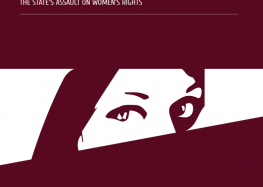The Comprehensive Population and Family Plan
In May 2013, the Comprehensive Population and Family Plan was introduced into the Iranian Parliament. The bill, which aims to encourage population growth, seeks to re-assert long-standing views held by conservatives in the Islamic Republic which hold that is against women’s nature to work outside the home and that her primary role is to bear children. Proponents of these views believe women’s employment weakens families and leads to an increased divorce rate and a plummeting population growth rate.
As Fatemeh Derakhshani, then-deputy Health Minister, stated in April 2013, “Until a few years ago the policy of the Health Ministry was reducing birth rates, but this has changed. Now we encourage every family to have more than 2 children. However, factors such as women’s education and employment prevent population growth.”
An editorial, “Women’s Employment and Damage to Family Foundation,” published in January 2013 by the Fars News Agency, which is associated with the Revolutionary Guards, elaborated more fully on the conservative view of women’s employment: “Because of society’s liberal models, some believe that financial independence for women through employment, which requires them to play a male role, is more important than women’s main roles…. Ultimately this leads to a harmful way of raising children; the attachment between husband and wife is weakened and therefore, the family foundation is damaged.”
In accordance with this view, the Comprehensive Population and Family Plan explicitly legislates a preference for hiring male employees. Article Nine of the bill states, “In both public and private sectors, the priority in hiring should be given to: males with children, married males without children, and females with children respectively. Single individuals may be hired if there are no qualified married applicants.” Note Two of Article Nine, incentivizes private sector compliance with the bill: “If this article is observed by a private sector employer for five years, the employer would be released of the 6% insurance payments for those employees who have been hired according to the said priorities. Instead, the government would cover the insurance cost. The government is obliged to cover the insurance cost from the date on which this bill goes into effect.”
The plan was discussed in Parliament in early August 2013, in the closing days of the Ahmadinejad administration. At that time, Zahra Sajjadi, who was an advisor to President Ahmadinejad and deputy head of the Center for Women and Family Affairs, said in an interview with Fars News Agency, “Because our religion states the man is the head of the family, men should be prioritized in hiring practices.”
The incoming administration objected, with Rouhani’s vice president for Women and Family Affairs Shahindokht Molaverdi stating, “The President’s vice president for Women and Family Affairs opposes not prioritizing the employment of single women. The bill is under expert review and soon we will hand over our findings to the Majlis (Parliament).” However, the bill has been passed by the Cultural Committee of Parliament and has been put in the agenda for a full Parliamentary vote. As of this writing it is unclear how the bill will fare. Parliament’s research arm, the Islamic Parliament Research Center, has criticized the bill, and the Rouhani administration is currently arguing that it does not have the funds needed to implement the Plan.




